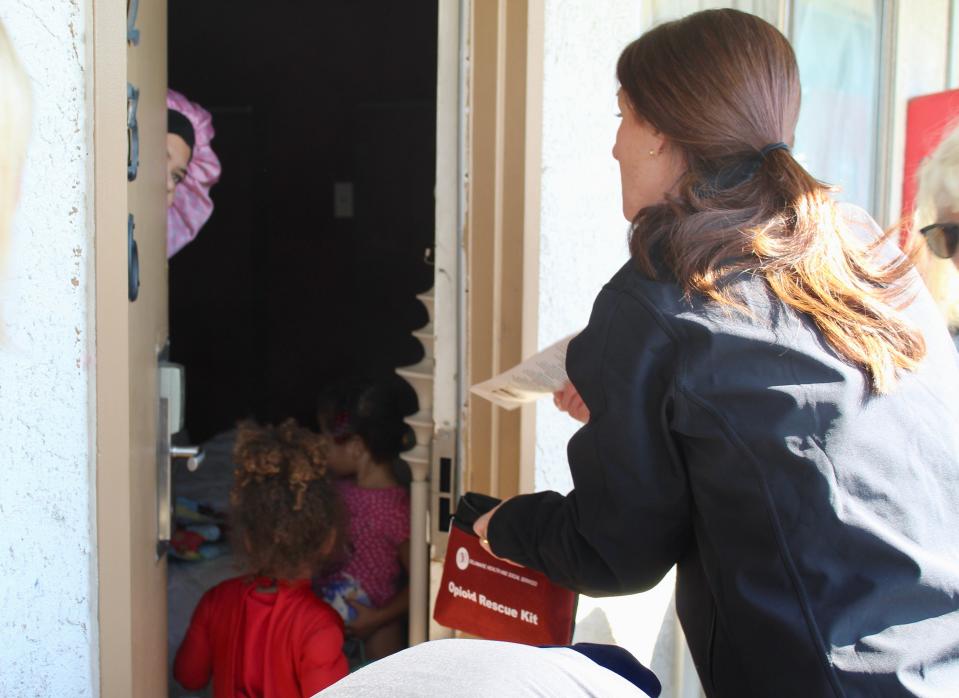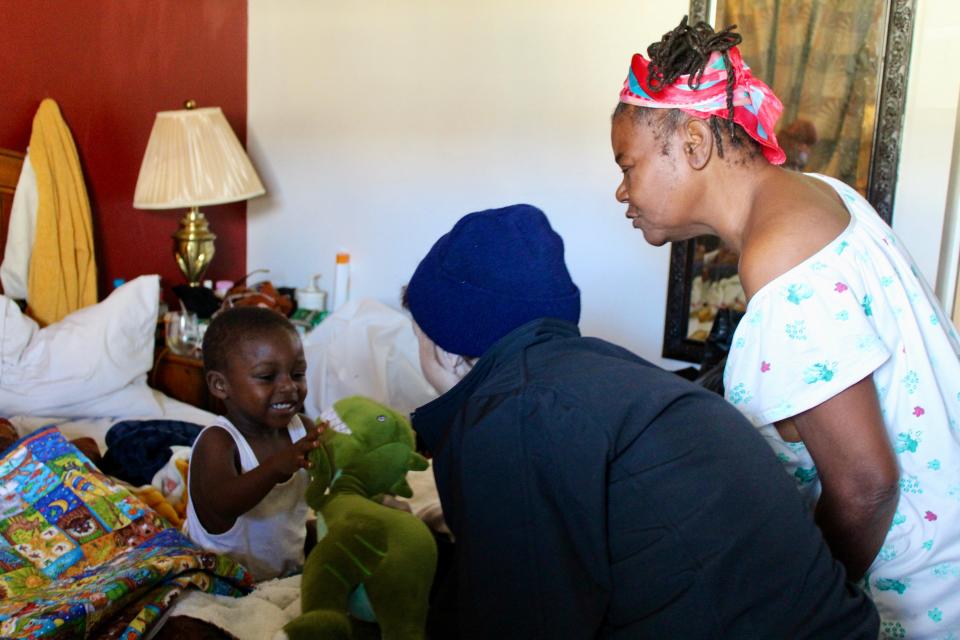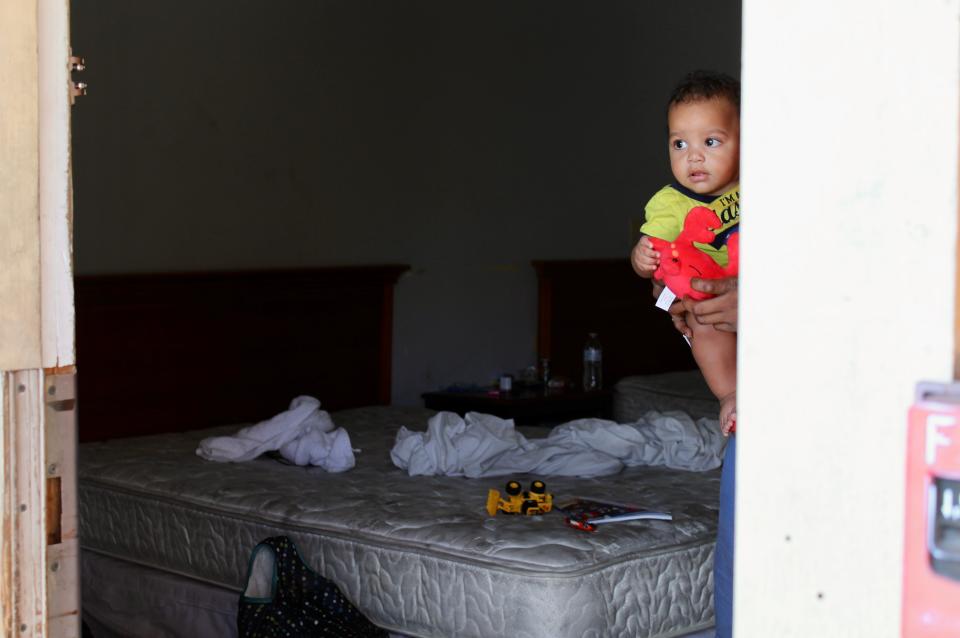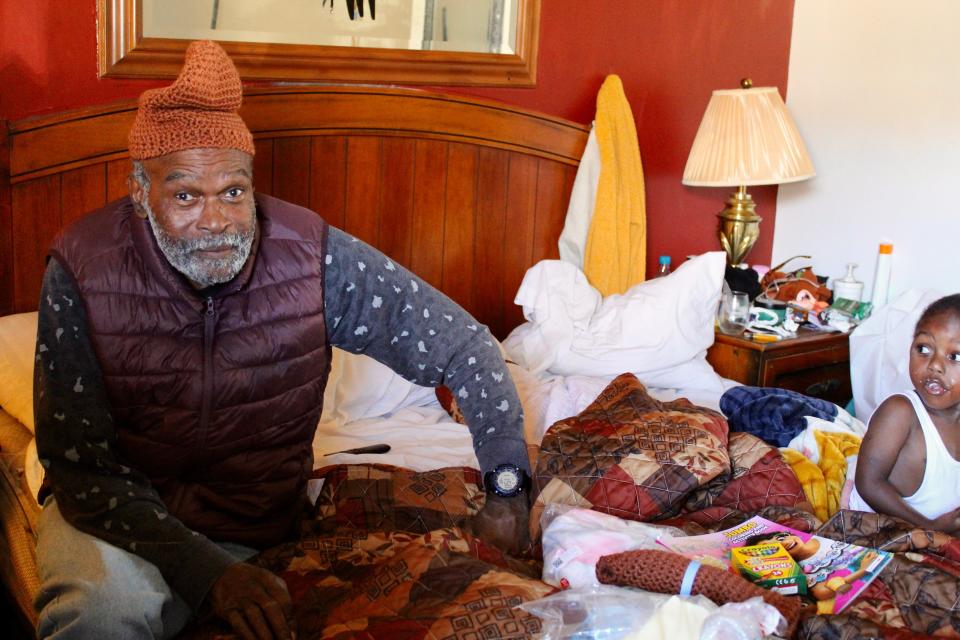'Beats living on the streets:' The Delawareans who call motels home during the holidays
Cheryl Dayton's room was plain, her yellow walls devoid of décor.
A thin blanket covered her double bed and several personal items were stacked in the corner by her bathroom. Just outside the second-floor motel room sat an old tin can that had been turned into a makeshift ashtray.
Though a Halloween sign hung on Dayton's door and a cat’s half-filled bowl of kibble rested on the floor near a desk, there was no hint that the older woman with graying hair and several missing teeth had been here for more than 500 days.
Her room, unlike many others who live semi-permanently at the Best Night Inn, wasn’t cluttered. And while she was more than happy to accept the Pop-Tarts, Ramen soup and knitted hats that outreach workers had brought to New Castle-area motel residents ahead of Thanksgiving, she waved off larger items such as pillows or blankets, instead encouraging them to go to others.

Dayton knows she’s one of the lucky ones.
After living here for nearly two years, this recent Thursday marked her second-to-last day at the motel.
Her name had finally made it to the top of the waitlist for an apartment at the Village of St. John, a 53-unit housing complex in Wilmington for low-income residents ages 62 and older. She’d be moving the following day.
Despite Dayton's fortune, the outlook was much bleaker just around the corner from her room.
A family of two adults and five kids ages 1, 3, 5, 7 and 8 were crammed into a single room. Below them, an older woman and her husband who’d been here for about two months were caring for their toddler grandson.
RELATED: He almost lost his arms to addiction. But Christiana Hospital did more than save his limbs
Across the street at the Superlodge, a woman who struggles with addiction was grappling with a difficult choice: Go to the New Castle County Hope Center with her children and be split up from a man she calls her boyfriend, or remain with him and hope to find somewhere else to stay.
The man, she said, is “not on my case” and wouldn’t be allowed to stay with her at the facility. Yet if she turned down the Hope Center room, it’s unknown whether she’d be offered housing there again.

As the holidays near, outreach groups such as the one this Thursday afternoon – men and women loosely associated with Brandywine Counseling and Community Services – will be out in force to ensure those staying in motels and shelters have food and clothing and the children have toys.
But the lingering question for these residents as they gratefully accepted the help was: What happens when the holidays are over and they’re still stuck here? Who, aside from this group that has long frequented the motels, will remember their struggles then?
‘Just no housing’
Dayton, who is disabled, had no idea when she moved to the Best Night Inn last year that she’d be here this long. But without the motel room, she’d be on the street.
Because she’s been unable to work for the last 15 years, she has no way of proving to a landlord that she’s a reliable renter. “What credit do I have?” she said as she took a bite of her lunch.
“As you can see, I’m eating Pop-Tarts,” she added, smiling.
Still, she was at an advantage when it came to the search for affordable housing.
As a single woman who is not caring for any grandchildren, she doesn’t require more than one bedroom. And because she is older, she has more options.

The Ministry of Caring — the Wilmington nonprofit that runs the Village of St. John — provides, among other services, both short- and long-term housing for certain low-income or sick individuals. It has three senior housing facilities, the most recently constructed of which is the Village.
Senior housing comprises the majority of the Ministry’s housing — it has 156 units for older residents, most of which can hold one or two people. The organization also offers several dozen spots at other locations for single women, single men, and men and women living with HIV/AIDS, as well as shorter-term housing options (though some residents can live at those residences for up to two years).
While the Ministry of Caring is far from the only housing provider for poor Delawareans, the need for low-cost options is dire. Finding affordable housing was difficult pre-coronavirus, but the pandemic only exacerbated America’s housing crisis.
With record numbers of people losing their jobs due to COVID-related shutdowns, families that were just scraping by were forced out of their homes. And while entities like the Delaware State Housing Authority have provided millions of dollars in rental assistance to keep people in their homes, in March of 2022, that particular organization announced it was no longer accepting new applications for public housing, rental assistance or housing choice vouchers.
Applications that were already accepted to the waitlist would continue to be processed, but the housing authority’s website said it had “more than a sufficient number of applications to fill vacancies in the programs listed above for the near future, and our current wait time is over three years.”

Any applications received for the waitlist would be returned. There’s been no update on when the list will reopen.
“There’s just no housing,” said Dr. Sandra Gibney, a local doctor who spearheads outreach in some of Delaware’s most underserved neighborhoods.
“It's not even that it's bad,” she continued as she prepared to knock on yet another motel door this crisp fall afternoon. “It's just like there's nothing.”
‘Beats living on the streets’
These motel residents know this all too well.
The older couple caring for their grandson a floor below Dayton hopes to only stay here for a few months. Yet even if they could find an apartment in their price range – which they’ve been unsuccessful at so far – their income is far below the two- or three-times monthly rent rule that many landlords follow.
They would barely have enough for a security deposit, the woman said. Forget the first and last month’s rent on top of that.
But while living in a small motel room with their grandson is far from ideal, “it beats living on the streets,” she said.
WHEN MOTELS BECOME HOME: With nowhere else to turn, addiction drives many to these places
As if to prove her point, soon after she spoke these words, Gibney and several other outreach workers on their way to the Superlodge passed two women trekking toward Route 9, their entire lives packed into plastic shopping bags.
When asked where they stay, one of the women, who struggles with addiction, replied that she’s homeless. As the group stopped to offer her coats and other clothing from the back of Gibney’s car, she explained that she’d lost almost everything.
Up until recently, she had been staying in a nearby park and stashing her belongings behind a row of bushes during the day. Unbeknownst to her, a grounds crew had instructions to cut down the shrubs.
By the time she returned to the park for the night, all the items she’d amassed had been stolen.
“I got nothin’ but what’s here,” she said, placing her shopping bags on the ground to try on a winter coat. “It’s all gone.”
Got a tip? Send to Isabel Hughes at ihughes@delawareonline.com or 302-324-2785. For all things breaking news, follow her on Twitter at @izzihughes_
This article originally appeared on Delaware News Journal: How Delaware motels became semi-permanent housing for these residents

